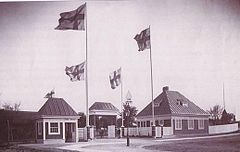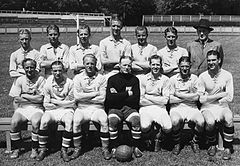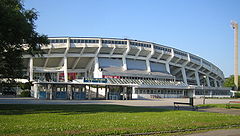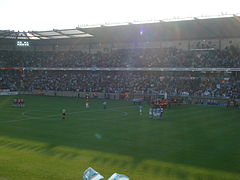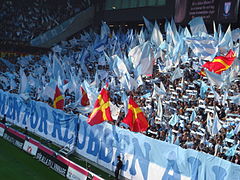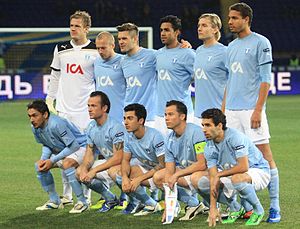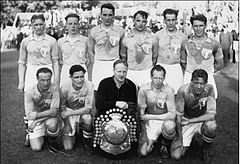- Malmö FF
-
This article is about Malmö FF's football department. For former departments of the club, see Malmö FF (disambiguation).
Malmö FF 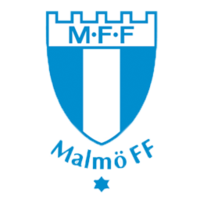
Full name Malmö Fotbollförening Nickname(s) Di blåe (The Blues)[1]
Himmelsblått (The Sky Blues)[1]Founded 24 February 1910 Ground Swedbank Stadion, Malmö
(Capacity: 24,000)Chairman Håkan Jeppsson Manager Rikard Norling League Allsvenskan 2011 Allsvenskan, 4th Home coloursAway coloursThird colours Current season
Current seasonMalmö Fotbollförening, also known simply as Malmö FF, are a Swedish professional football club based in Malmö. The club is affiliated with Skånes Fotbollförbund and play their home games at Swedbank Stadion.[2] The club colours, reflected in their crest and kit, are sky blue and white. Formed on 24 February 1910, the club have won sixteen national championship titles and fourteen national cup titles, making them the most successful club in Sweden in terms of total trophies won.[3] Malmö FF have also won the highest Swedish league, Allsvenskan, on three occasions when the title of Swedish champions was not decided by the outcome of that league.[4][A] They were runners-up in the 1979 European Champions Cup final, which they lost 1–0 to English club Nottingham Forest.[5] This made them the only Swedish football club, as of 2011, to have reached the final of the competition, for which the team were awarded the Svenska Dagbladet Gold Medal.[6]
Malmö FF are an open member association and the annual general meeting is the highest policy-making body. The meeting approves the accounts and elects the chairman and board. Håkan Jeppsson is the current chairman, elected in 2010. Daily operations are run by a managing director who liaises with the chairman. With an equity of 78 million SEK (approximately €8.8 million) the club are the richest football club in Sweden as of 2011.[7]
The club are currently playing in Allsvenskan, where the season lasts from April to October. The club first won Allsvenskan in 1944.[8] Malmö FF were most successful during the 1970s, when they won five Swedish championships and four Svenska Cupen titles. The main rivals of the club are Helsingborgs IF, IFK Göteborg and historically IFK Malmö.[9] MFF Support is the official fan club of Malmö FF.[10] The club have also been featured in the media, including the football documentaries Blådårar 1 and Blådårar 2.
Contents
History
Early years
The club arose from a municipal initiative in 1905 to encourage young people in Malmö to play organised football. One of the youth teams, Bollklubben Idrott, also known simply as BK Idrott, was a predecessor to Malmö FF. BK Idrott joined the newly created football department of IFK Malmö in 1909, but soon left because of issues between the two clubs. On 24 February 1910 the 19 members of BK Idrott founded Malmö FF; the first chairman was Werner Mårtensson.[11][12]
The club spent their first ten years in local and regional divisions as there was no official national league competition, playing the majority of their matches in the city division called Malmömästerskapen. They also competed in regional competitions in Scania, and played matches against Danish clubs. In 1916 Malmö FF reached the final of the Scanian regional competition (Distrikmästerskapen) for the first time, playing against rival Helsingborgs IF but losing 3–4.[13] The club defeated local rival IFK Malmö three times during the season, and thus earned the unofficial but much desired title of Malmö's best football club.[14] In 1917 Malmö FF competed in Svenska Mästerskapet for the first time, a cup tournament for the title of Swedish champions, but lost their first match in the second qualifying round 4–1 against IFK Malmö. The club continued to play in the cup until 1922, reaching the quarter-finals in 1920 when they were knocked out by Landskrona BoIS. The cup was eventually discontinued and the title of Swedish champions was given to the winners of Allsvenskan which was first created for the 1924–25 season.[15][A]
In 1920 the Swedish Football Association invited Swedish football clubs to compete in official national competitions. Malmö FF earned a place in Division 2 Sydsvenska Serien. They won this division in the first season, and were promoted to Svenska Serien Västra, the highest level of competition in Sweden at the time. However, they were relegated after a single season, and found themselves back in Sydsvenska Serien for nearly a decade until they again achieved promotion to Allsvenskan, in 1931.[16]
First years in Allsvenskan and early achievements
The club achieved mid-table league positions for two seasons, but they were relegated in 1934 as a penalty for breaking amateur regulations. The club had paid their players a small sum of money for each game. Although against the rules, this was common at the time; Malmö FF were the only club to show it in their accounting records. In addition to relegation to Division 2, the club suffered bans for the entire board of directors and twenty-six players. The version of events told by Malmö FF and local press suggests that local rival IFK Malmö reported the violation to the Swedish Football Association. This belief has contributed to the longstanding competitive tensions between the clubs.[17][18][19]
The club made their way back to Allsvenskan in 1937 after two seasons in Division 2. In the same year Eric Persson was elected as chairman after being secretary since 1929, and held the position until 1974. Persson is regarded by club leaders and fans as the most important person in the club's history, as he turned the club professional in the 1970s and under his leadership the club went from being titleless in 1937 to holding ten Swedish championships by the end of the 1974 season.[20] In 1939 the club reached their highest position yet, third place in Allsvenskan, nine points behind champions IF Elfsborg. Malmö FF's first Swedish championship came in 1944, when the club won the penultimate game of the season against AIK before 36,000 spectators at Råsunda. The last game of the season was won 7–0 against Halmstad BK.[21]
For the next nine seasons, Malmö FF finished in the top three in the league. The club won the Swedish Championship in 1949, 1950, 1951 and 1953, and were runners-up in 1946, 1948 and 1952. The club also won Svenska Cupen in 1944, 1946, 1947, 1951 and 1953, and finished as runners-up in 1945. Between 6 May 1949 and 1 June 1951, the team were unbeaten in 49 matches, of which 23 were an unbroken streak of victories.[22]
The club finished as runners-up in Allsvenskan twice more, in 1956 and 1957. The following year the club left Malmö IP for Malmö Stadion, which had been built for the 1958 FIFA World Cup, and was to host the club for the next 50 years. In 1964 Malmö FF contracted Spanish manager Antonio Durán; this was the first of a series of changes that led to the most successful era in the club's history. Young talents such as Lars Granström and Bo Larsson emerged during the early 1960s and would prove to be crucial ingredients in the success that would come in the 1970s. The club finished second in 1964 but went on to win their sixth Swedish Championship in 1965, when Bo Larsson scored 28 goals to finish as the league's top goal scorer. Malmö FF once again won Allsvenskan in 1967, after a less successful year in 1966. The club's young players, as well as talents bought in from neighbouring clubs in Scania in 1967, became a team that consistently finished in the top three in Allsvenskan.[23]
Successful 1970s, European Cup 1979, 1980s and 1990s
After finishing as runners-up in Allsvenskan for the final two years of the 1960s, Malmö FF started the most successful decade of their history with a Swedish Championship in 1970. The club won Allsvenskan in 1970, 1971, 1974, 1975 and 1977 as well as Svenska Cupen in 1976 and 1978. The 1977 Allsvenskan victory qualified the club for the 1978–79 European Cup, and after victories against AS Monaco, Dynamo Kiev, Wisla Krakow and Austria Wien, they reached the final of the competition, which they played at Olympiastadion in Munich against Nottingham Forest. Trevor Francis, who scored the only goal of the match, won it 1–0 for Forest. Nevertheless the 1979 European Cup run is the biggest success in the history of Malmö FF.[24] The team were given the Svenska Dagbladet Gold Medal the same year, awarded for the most significant Swedish sporting achievement of the year, for their achievement in the European Cup.[6]
Much of the success during the 1970s was due to new tactics and training methods brought to the club by Englishman Bob Houghton, who managed the club between 1974 and 1980. Eric Persson was succeeded as chairman in 1974 by Hans Cavalli-Björkman. After the team performed respectably under managers Keith Blunt and Tord Grip in the early 1980s, Roy Hodgson took over in 1985. He led the club to two Swedish Championships in 1986 and 1988, and the club won Allsvenskan five years in a row between 1985 and 1989. At the time, the championship was decided by play-offs between the best teams after the end of the regular season; this arrangement was in place from 1982 until 1992. The club reached the play-off final four times between 1986 and 1989 but only managed to win the final twice. Apart from Allsvenskan and Swedish Championships, the club won Svenska Cupen in 1984, 1986 and 1989.[25]
Other than finishing as runners-up in Allsvenskan in 1996, the team did not excel in the 1990s, as the club failed to win Allsvenskan and Svenska Cupen throughout the entire decade. The 1990s ended with relegation from Allsvenskan in 1999. Hans Cavalli-Björkman was succeeded as chairman by Bengt Madsen in 1999, and former player Hasse Borg was contracted as Director of Sport. These operational changes, as well as the emergence of young talent Zlatan Ibrahimović, led to the return to Allsvenskan in 2001. Ibrahimović rose to fame and became an important player in the club's campaign to return to the top league. He was later sold to Ajax in 2001, before playing for Juventus, Internazionale, FC Barcelona and eventually AC Milan in 2010.[26]
Start of the 2000s to the present
The return to Allsvenskan was the start of the successful early 2000s, under the management of Tom Prahl, when the club finished in the top three three times in a row. In 2004, it won Allsvenskan, the club's fifteenth Swedish Championship. In 2005 the club reached the last qualifying round for the UEFA Champions League but were defeated by FC Thun. Successful sponsor work and player sales also made Malmö FF the richest club in Sweden, a position they still hold as of 2011.[27][28] The club moved from Malmö Stadion to Swedbank Stadion in 2009, a stadium built entirely for football and located next to the old one.[29]
In 2009, Madsen announced that he would step down as chairman, and was replaced by Håkan Jeppsson early the following year.[30] In 2010 the club marked their 100th anniversary with many celebratory events at the beginning of the season. On the day of the club's 100th anniversary in 2010, the Swedish football magazine Offside declared Malmö FF to be the greatest football club in Swedish history.[31] The season became a great success as the club won Allsvenskan for the nineteenth time and became Swedish champions for the sixteenth time.[32] Unlike in 2004, these successes were achieved without any major transfers before the season, and with a squad consisting mostly of younger players.[33] The club remain one of the dominant football clubs in Sweden. In the 2011 season the club ranked second in the overall Allsvenskan table maratontabellen.[34] Malmö FF are also the record holders for total number of Allsvenskan championships and Svenska Cupen championships, and second only to IFK Göteborg in number of Swedish championships.[8][35]
Colours and crest
Home kit from 1920 to the present Home kit between 1910 and 1920 Home kit for the 1910 season The club are often known by the nicknames Di blåe (The Blues) and Himmelsblått (The Sky Blues). This is because of the club colours, sky blue and white. The players wear sky-blue shirts, white shorts, and sky-blue socks. The away colours are red and white striped shirts, black shorts, and red socks. Various alternative kits have been used for European play such as all-white kits introduced in the 1950s and all-black kits with sky-blue and golden edges and text used for European play in 2005.[36]
The club colours have not always been sky blue. The predecessor club BK Idrott wore blue and white striped shirts and white shorts, and this kit was still used for the first six months of 1910 after Malmö FF was founded. This was later changed to red and white striped shirts and black shorts to symbolise that Malmö FF were a new club, and a very similar kit is now used as the away kit for historical reasons. The present sky-blue kit was introduced in 1920.[37] Since 2010 a small Scanian flag is featured on the back of the shirt just below the neck.[38]
The crest of Malmö FF consists of a shield with two vertical sky-blue fields on the sides, and one vertical white field in the middle. Underneath the shield is "Malmö FF" spelled out in sky-blue letters with a sky-blue star under the text. In the top area of the shield is a white horizontal field over the three vertical fields. The abbreviation of the club name "MFF" is spelled out with sky-blue letters in this field. On top of the shield are five tower-like extensions of the white field. The present shield crest made its debut on the shirt in the 1940s.[39] There were other crests before this but they were never featured on the shirt. While the first crest was black and white, the second crest was red and white in accordance with the club's main colours between 1910 and 1920.[36]
In modern times a golden star has been added over the shield. This is a feature used only on the crests on player shirts. The star is used to symbolize that the club have won more than ten domestic titles. In the original shield logo the full club name and sky-blue star beneath the shield were not featured, they were later added when club chairman Eric Persson discovered while abroad that people had trouble identifying what city the club came from just by looking at the club crest. For the 100th anniversary of the club in 2010, the years 1910 and 2010 were featured on each side of the shield on a sky-blue ribbon behind the shield.[38] In 2011 the club introduced a new away kit, an all-white kit to be used as an alternative dress in European club competitions as well as Allsvenskan.
Supporters and rivalries
See also: MFF SupportMalmö FF are well known for their large local following.[40] The club have several fan clubs, of which the largest is the official fan club MFF Support. It was founded in 1992. MFF Support describes itself as "an idealistic and non-political association working against violence and racism".[10] The current chairman of MFF Support is Magnus Ericsson.[41]
There are also several smaller independent supporter groups. The most prominent of these is Supras Malmö, which was founded in 2003 by a coalition of smaller ultras groups and devoted fans.[42] The name "Supras" is derived from the words supporters and ultras – the latter indicating that the group is inspired by a fan culture with roots in the Mediterranean. Supras Malmö is the most visible group in the main supporter stand at Swedbank Stadion, marking its presence with banners, flags and choreography. Another group with similar goals is Rex Scania. MFF Tifosi 96 is a network of supporters creating tifos for special occasions and important games.[43] The average attendance for the club's games in the 2011 season was 12,388, the second best attendance in 2011 Allsvenskan after AIK.[44]
Because of geographical proximity, minor rivalries exist with Trelleborgs FF and Landskrona BoIS, which are both also located in Scania.[9] The main rivals of the club are Helsingborgs IF, IFK Göteborg and IFK Malmö. The rivalry between Malmö FF and Helsingborgs IF has existed since Malmö FF were promoted up to Allsvenskan in the 1930s, and is primarily geographic, since both teams are from Scania in southern Sweden. The rivalry with IFK Göteborg relates more to title clashes; the two are the most successful clubs in Swedish football history and the only two to have appeared in European cup finals, IFK Göteborg in the UEFA Cup in 1982 and 1987 and Malmö FF in the European Cup in 1979.[9]
The rivalry with IFK Malmö is both geographical and historical. The two clubs come from the same city and used to play at the same stadium in the early 20th century. The supposed actions of board members of IFK Malmö in 1933, revealing Malmö FF's breaches of amateur football rules to the Swedish Football Association, further contribute to the competitive tensions between the two clubs.[17][18][19] IFK Malmö have not played in Allsvenskan since 1962; thus matches between the two sides are rare.[45]
Stadiums
Malmö FF's first stadium was Malmö IP, which was shared with arch-rivals IFK Malmö. The team played here from the founding of the club in 1910, until 1958. The stadium still exists today, albeit with lower capacity, and is now used by women's team LdB FC Malmö, who were previously the women's section of Malmö FF. Capacity in 2011 is 7,600, but attendances were usually much higher when Malmö FF played there. For the last season in 1957, the average attendance was 15,500. The club's record attendance at Malmö IP is 22,436 against Helsingborgs IF on 1 June 1956.[46] The stadium is still considered a key part of the club's history, as it was here that the club were founded, played their first 47 seasons, and won five Swedish championships.[47]
A new stadium was constructed in Malmö after Sweden was awarded the 1958 FIFA World Cup – this saw the birth of Malmö Stadion. Malmö FF played their first season at the stadium in 1958. The first time the club won the Swedish championship at the stadium was in 1965.[46] An upper tier was added to the stadium in the 1980s, and was completed in 1992.[48] The club enjoyed the most successful era of their history at this stadium, winning ten out of sixteen Swedish championships while based there. The stadium originally had a capacity of 30,000 but this was lowered to 27,500 due to changes in safety regulations. The club's record attendance at the stadium was 29,328 against Helsingborgs IF on 24 September 1967.[49]
Following the 2004 victory in Allsvenskan,[50] plans were made to construct a new stadium. In July 2005, Malmö FF announced that work was to begin on Swedbank Stadion, designed for 18,000 seated spectators and 6,000 standing. The stadium can also accommodate 21,000 as an all-seater for international and European games in which terracing is not allowed. Construction started in 2007 and was finished in 2009. The new stadium is located next to Malmö Stadion. Although there was still small-scale construction going on around the stadium at the time, the stadium was inaugurated on 13 April 2009 with the first home game of the 2009 season against Örgryte IS; Malmö FF's Labinot Harbuzi scored the inaugural goal in the 61st minute.[51] The first Swedish championship won at the stadium occurred in 2010, when the club beat Mjällby AIF on 7 November in the final game of the season 2–0. Attendance at this game set the stadium record of 24,148.[32][52] Swedbank Stadion is a UEFA category 4 rated stadium.[53]

A panorama of Swedbank Stadion from the Falcon stand, showing from left to right the PEAB stand, the Eon stand and the Sydsvenskan stand Ownership and finances
Malmö FF made the transition from an amateur club to fully professional in the late 1970s under the leadership of club chairman Eric Persson.[54] The club are an open member association, and the annual general meeting is the highest policy-making body where each member has one vote, therefore no shares are issued. The meeting approves the accounts, votes to elect the chairman and the board, and decides on incoming motions. The current chairman is Håkan Jeppsson who has been chairman since 2010 after taking over after Bengt Madsen. The club's legal status means that any interest claims are made to the club and not to the board of directors or club members. Daily operations are run by a managing director who liaises with the chairman.[55]
With an equity of 78 million SEK the club are the richest football club in Sweden as of 2011. The turnover for 2010, excluding player transactions, was 148.3 million SEK which was the highest turnover to date.[7] The highest transfer fee received by Malmö FF for a player was 86.2 million SEK for Zlatan Ibrahimović who was sold to Ajax in 2001. As of 2011, this is the highest transfer fee ever paid to a Swedish football club.[56]
The main sponsors of Malmö FF are Elitfönster AB, BE Group, JMS Mediasystem, Svenska Spel, Sydtotal, Telia, SOVA and Mercedes-Benz. The club also have a naming rights deal with Swedbank regarding the name of Swedbank Stadion and four stand sponsors; E.ON, Carlsberg (currently marketing their brand Falcon), PEAB and Sydsvenskan. The current kit manufacturers are Puma, they also sponsor the club and many of Puma's products are sold in the official Malmö FF souvenir shop at Swedbank Stadion.[57] The current shirt sponsor is ICA.[58]
Media coverage
Malmö FF have been the subject of several films. Some examples are Swedish football documentaries Blådårar 1 and Blådårar 2, which portray the club from both supporter and player perspectives during the 1997 and 2000 seasons. Blådårar 1 is set in 1997, when the club finished third in Allsvenskan. The film focuses on devoted fan Lasse, player Anders Andersson, former chairman Hans Cavalli-Björkman and other individuals.[59][60] Blådårar 2 is set in 2000, the year after the club had been relegated to Superettan, and follows the team as they fight for Malmö FF's return to Allsvenskan.[61][62] The second film continues to follow Lasse, but also has a significant focus on Zlatan Ibrahimović, his progress and how he was eventually sold to AFC Ajax during the 2001 season.[63]
The club have also been featured in Mitt Hjärtas Malmö, a series of documentaries covering the history of Malmö. Clips used included match footage from the 1940s (Volume 7), and match footage from the 1979 European Cup Final in Munich from a fan's perspective (Volume 8).[64] Volume 9 of the series is devoted entirely to coverage of the club's 100th anniversary in 2010.[65]
In the 2005 Swedish drama movie Om Sara, actor Alexander Skarsgård plays the fictional football star Kalle Öberg, who plays for Malmö FF.[66][67] Finally, a recurring sketch in the second season of the comedy sketch show Hipphipp! involved a group of Malmö FF fans singing and chanting while performing everyday tasks, such as shopping or operating an ATM.[68]
Players
Current squad
As of 25 October 2011[69] Note: Flags indicate national team as has been defined under FIFA eligibility rules. Players may hold more than one non-FIFA nationality.
No. Position Player 2 
DF Ulrich Vinzents 3 
DF Jasmin Sudić 4 
DF Daniel Andersson (captain) 5 
MF Miljan Mutavdžić 6 
DF Markus Halsti 7 
FW Daniel Larsson 9 
MF Wílton Figueiredo 10 
MF Jiloan Hamad 11 
MF Jeffrey Aubynn 13 
FW Mathias Ranégie 14 
DF Miiko Albornoz 15 
DF Pontus Jansson 16 
DF Yago Fernández No. Position Player 17 
MF Ivo Pękalski 18 
MF Amin Nazari 19 
FW Dardan Rexhepi 20 
DF Ricardinho 21 
MF Jimmy Durmaz 22 
DF Filip Stenström 23 
DF Tobias Malm 24 
FW Agon Mehmeti 25 
GK Dušan Melichárek 27 
GK Johan Dahlin 28 
FW Alexander Nilsson 30 
GK Dejan Garača Available youth players
As of 12 November 2011[69] Note: Flags indicate national team as has been defined under FIFA eligibility rules. Players may hold more than one non-FIFA nationality.
No. Position Player 
MF Simon Kroon No. Position Player 
DF Filip Helander Out on loan
As of 25 October 2011[69] Note: Flags indicate national team as has been defined under FIFA eligibility rules. Players may hold more than one non-FIFA nationality.
No. Position Player 
MF Rick Kruys (at FC Volendam until the end of the 2011–12 season)[70] For season transfers, see transfers winter 2011–2012.
Notable players
See also: List of Malmö FF players and Category:Malmö FF playersList criteria:
- player has made more than 500 appearances for the club, or
- player has won Guldbollen[71], an official UEFA award[72][73] or
- player has been picked as one of the 11 best players in the official Sydsvenskan team.[74]
Name Years Games Goals Guldbollen UEFA Award Sydsvenskan team  Erik Nilsson
Erik Nilsson1934–1953 600 4 1950  Helge Bengtsson
Helge Bengtsson1934–1951 501 3  Prawitz Öberg
Prawitz Öberg1952–1965 515 103 1962  Ingvar Svahn
Ingvar Svahn1957–1968
1970414 161 1967  Bo Larsson
Bo Larsson1962–1966
1969–1979546 289 1965
1973Yes  Krister Kristensson
Krister Kristensson1963–1979 626 16 Yes  Roy Andersson
Roy Andersson1968–1983 624 49 1977 Yes  Roland Andersson
Roland Andersson1968–1974
1977–1983564 13  Jan Möller
Jan Möller1971–1980
1984–1988591 1 1979 Yes  Ingemar Erlandsson
Ingemar Erlandsson1976–1987 473 46 Yes  Magnus Andersson
Magnus Andersson1975–1988 568 28  Robert Prytz
Robert Prytz1977–1982
1983–1995262 57 1986 Yes  Torbjörn Persson
Torbjörn Persson1980–1995 574 39  Jonnie Fedel
Jonnie Fedel1984–2001 588 1  Jonas Thern
Jonas Thern1985–1987
1988–1989160 30 1989 Yes  Martin Dahlin
Martin Dahlin1987–1991 176 83 1993 Yes  Stefan Schwarz
Stefan Schwarz1987–1991 103 7 1999 Yes  Patrik Andersson
Patrik Andersson1989–1992
2004–2005184 24 1995
2001Team of the Year
2001Yes  Zlatan Ibrahimović
Zlatan Ibrahimović1999–2001 69 16 2005
2007
2008
2009
2010
2011Team of the Year
2007
2009Yes  Jari Litmanen
Jari Litmanen2005–2007 18 6 Jubilee Awards Management
Organisation
As of 7 February 2011[75][76][77]
Name Role  Håkan Jeppsson
Håkan JeppssonChairman  Per Nilsson
Per NilssonManaging Director  Pontus Hansson
Pontus HanssonSecretary See also: List of Malmö FF chairmenTechnical staff
As of 29 October 2011[69]
Name Role  Rikard Norling
Rikard NorlingHead Coach First Team  Jörgen Pettersson
Jörgen PetterssonAssistant Coach First Team  Daniel Andersson
Daniel AnderssonAssistant Coach First Team  Simon Hollyhead
Simon HollyheadAssistant Coach First Team
Fitness Coach Leif Engqvist
Leif EngqvistFirst Team Coach / Head Coach U-21  Mats Engqvist
Mats EngqvistHead Coach Youth Academy  Staffan Tapper
Staffan TapperYouth Talent Coach  Jonnie Fedel
Jonnie FedelGoalkeeping Coach  Per Ågren
Per ÅgrenDirector Of Sports  Wilner Registre
Wilner RegistrePhysiotherapist  Dr. Pär Herbertsson
Dr. Pär HerbertssonClub Doctor  Vito Stavljanin
Vito StavljaninHead Scout Notable managers
See also: List of Malmö FF managers and Category:Malmö FF managersThis is a list of managers who have won one or more titles at the club[78]
Name Years Swedish Champions Svenska Cupen  Sven Nilsson
Sven Nilsson1944
1945–1947
19501943–44 1944
1946
1947 Kálmán Konrád
Kálmán Konrád1947–1950 1948–49
1949–50 Bert Turner
Bert Turner1951–1955 1950–51
1952–531951
1953 Antonio Durán
Antonio Durán1964–1971 1965
1967
1970
19711967  Karl-Erik Hult
Karl-Erik Hult1972–1973 1972–73  Bob Houghton
Bob Houghton1974–1980
1990–19921974
1975
19771973–74
1974–75
1977–78
1979–80 Tord Grip
Tord Grip1983–1984 1983–84  Roy Hodgson
Roy Hodgson1985–1989 1986
19881985–86
1988–89 Tom Prahl
Tom Prahl2002–2005 2004  Roland Nilsson
Roland Nilsson2008–2011 2010 Statistics
Malmö FF have played 76 seasons in Allsvenskan. The only clubs to have played more seasons are AIK with 83 and IFK Göteborg with 79. As a result, the club are positioned second in the all-time Allsvenskan table. They are the only Swedish club to have played a European Cup final, having reached the 1979 European Cup Final.[3][4]
Club honours
Malmö FF have won domestic, national, and international honours. The club currently holds the records for most Allsvenskan and Svenska Cupen titles. The majority of Malmö FF's honours are from the 1970s. The club's last major honour was in 2010 when they won Allsvenskan.[3][4] The club first played in Europe for the 1964–65 European season in the European Cup, and most recently in the 2011–12 European season in qualification for the UEFA Champions League. They have played in the UEFA Champions League fourteen times and in the UEFA Europa League twelve times. The club have also played in other now defunct European competitions such as the UEFA Cup Winners' Cup and the UEFA Intertoto Cup.[79][80]
Domestic
- Swedish Champions[3][A]
- Winners (16): 1943–44, 1948–49, 1949–50, 1950–51, 1952–53, 1965, 1967, 1970, 1971, 1974, 1975, 1977, 1986, 1988, 2004, 2010
League
- Allsvenskan (Tier 1)[3]
- Winners (19): 1943–44, 1948–49, 1949–50, 1950–51, 1952–53, 1965, 1967, 1970, 1971, 1974, 1975, 1977, 1985, 1986, 1987, 1988, 1989, 2004, 2010
- Runners-up (14): 1945–46, 1947–48, 1951–52, 1955–56, 1956–57, 1964, 1968, 1969, 1976, 1978, 1980, 1983, 1996, 2002
- Division 2 Sydsvenska Serien (Tier 2)[81]
- Winners (1): 1920–21
- Runners-up (1): 1923–24
- Division 2 Södra (Tier 2)[82]
- Winners (3): 1930–31, 1934–35, 1935–36
- Runners-up (1): 1929–30
- Superettan (Tier 2)[83]
- Runners-up (1): 2000
Cups
- Svenska Cupen[3]
- Winners (14): 1944, 1946, 1947, 1951, 1953, 1967, 1972–73, 1973–74, 1974–75, 1977–78, 1979–80, 1983–84, 1985–86, 1988–89
- Runners-up (3): 1945, 1970–71, 1995–96
- Allsvenskan play-offs[3]
- Winners (2): 1986, 1988
- Runners-up (2): 1987, 1989
- Supercupen[84]
- Runners-up (1): 2011
Doubles
- Swedish Champions and Svenska Cupen[3]
- Winners (7): 1943–44, 1950–51, 1952–53, 1967, 1974, 1975, 1986
European
- European Champion Clubs' Cup[3]
- Runners-up (1): 1978–79
Worldwide
- Intercontinental Cup[4]
- Runners-up (1): 1979
Footnotes
- A. ^ The title of "Swedish Champions" has been awarded to the winner of four different competitions over the years. Between 1896 and 1925 the title was awarded to the winner of Svenska Mästerskapet, a stand-alone cup tournament. No club were given the title between 1926 and 1930 even though the first-tier league Allsvenskan was played. In 1931 the title was reinstated and awarded to the winner of Allsvenskan. Between 1982 and 1990 a play-off in cup format was held at the end of the league season to decide the champions. After the play-off format in 1991 and 1992 the title was decided by the winner of Mästerskapsserien, an additional league after the end of Allsvenskan. Since the 1993 season the title has once again been awarded to the winner of Allsvenskan.[8]
Notes
- ^ a b Törner, 2005, pp. 42.
- ^ "Kontaktuppgifter och tävlingar – Skånes Fotbollförbund – Skaneboll.se" (in Swedish). http://www.skaneboll.se/forbund/foreningar/?feid=10661. Retrieved 2011-01-12.
- ^ a b c d e f g h i "Fakta" (in Swedish). mff.se. http://www.mff.se/Ditt_MFF/Om_klubben/Fakta.aspx. Retrieved 2009-11-24.
- ^ a b c d "Malmö FF" (in Swedish). svenskfotboll.se. http://svenskfotboll.se/allsvenskan/lag/?flid=25517. Retrieved 2011-01-01.
- ^ "1978/79: Forest join élite club". uefa.com. http://www.uefa.com/uefachampionsleague/history/season=1978/index.html. Retrieved 2011-02-07.
- ^ a b "Bragdmedaljörer genom tiderna" (in Swedish). svd.se. http://www.svd.se/sportspel/bragdguldet/bragdmedaljorer-genom-tiderna_485089.svd. Retrieved 2011-02-01.
- ^ a b "Årsredovisning 2010 - Positiva tecken trots ett svagt resultat". mff.se. http://www.mff.se/Aktuellt/Nyheter/2011-02-18_arsredovisning_och_sammanfattning.aspx. Retrieved 2011-03-02.
- ^ a b c "Svenska mästare 1896–1925, 1931–" (in Swedish). svenskfotboll.se. http://svenskfotboll.se/allsvenskan/historik/. Retrieved 2009-11-25.
- ^ a b c Törner, 2005, pp. 52–54.
- ^ a b "Vad är MFF Support?" (in Swedish). mff-familjen.se. http://www.mff-familjen.se/mff-support/mff-support-2/. Retrieved 2009-11-24.
- ^ Smitt, 2009, pp. 14–16.
- ^ "1910–1939" (in Swedish). mff.se. http://www.mff.se/Ditt_MFF/Om_klubben/Historik/1910-1939.aspx. Retrieved 2010-12-17.
- ^ Smitt, 2009, p. 17.
- ^ Smitt, 2009, pp. 16–17.
- ^ Smitt, 2009, p. 258.
- ^ Smitt, 2009, pp. 20–21.
- ^ a b Smitt, 2009, pp. 25–26.
- ^ a b "Malmö FF" (in Swedish). malmo.se. http://www.malmo.se/Medborgare/Kultur--noje/Arkiv--historia/Kulturarv-Malmo/L-O/Malmo-FF.html. Retrieved 2011-01-17.
- ^ a b "Historia po himmaplan" (in Swedish). sydsvenskan.se. http://www.sydsvenskan.se/kultur-och-nojen/dygnetrunt/article82640/Historia-po-himmaplan.html. Retrieved 2011-01-17.
- ^ Smitt, 2009, pp. 165.
- ^ Smitt, 2009, pp. 27–35.
- ^ Smitt, 2009, pp. 40–48.
- ^ Smitt, 2009, pp. 49–58.
- ^ Smitt, 2009, pp. 58–67.
- ^ Smitt, 2009, pp. 76–80.
- ^ Smitt, 2009, pp. 84–90.
- ^ Smitt, 2009, pp. 89–90.
- ^ "MFF är Sveriges rikaste klubb" (in Swedish). idrottensaffarer.se. http://www.idrottensaffarer.se/affarer/2009/02/mff-ar-sveriges-rikaste-klubb. Retrieved 2010-12-17.
- ^ Smitt, 2009, pp. 94–95.
- ^ "Välbesökt årsmöte valde Håkan Jeppsson till ny ordförande" (in Swedish). mff.se. http://www.mff.se/Aktuellt/Nyheter/2010-02-19_Arsmotet.aspx. Retrieved 2010-12-17.
- ^ Regnell, Tobias; Ystèn, Henrik (2010). "Störst i Sverige" (in Swedish). Offside (Offside) (2): 64–81. ISSN 1404-6822. http://www.offside.org/magasinet/smyglaesning.aspx?id=4605&templateName=preview. Retrieved 2011-02-19.
- ^ a b "Malmö FF – Svenska mästare 2010" (in Swedish). mff.se. http://www.mff.se/Aktuellt/Nyheter/2010-11-07_SM-GULD.aspx. Retrieved 2010-12-17.
- ^ "Det hänger på de unga" (in Swedish). svenskfotboll.se. http://svenskfotboll.se/allsvenskan/arkiv/svensk-fotboll/2010/12/det-hanger-pa-de-unga-/. Retrieved 2010-12-17.
- ^ "Maratontabellen" (in Swedish). svenskfotboll.se. http://svenskfotboll.se/allsvenskan/historik/maratontabell/. Retrieved 2009-11-25.
- ^ "Svenska Cupens finaler 1941–" (in Swedish). svenskfotboll.se. http://svenskfotboll.se/cuper/svenska-cupen-herrar/cupmastare-1941-/. Retrieved 2010-12-18.
- ^ a b Törner, 2005, p. 40.
- ^ Smitt, 2009, pp. 16, 20.
- ^ a b "Nu släpper vi matchtröjan för jubileumssäsongen!" (in Swedish). mff.se. http://www.mff.se/Aktuellt/Nyheter/2009-12-09_Jubileumstrojan.aspx. Retrieved 2010-12-17.
- ^ Smitt, 2009, p. 20.
- ^ "Malmö i topp även i publikligan" (in Swedish). svenskfotboll.se. http://svenskfotboll.se/allsvenskan/arkiv/svensk-fotboll/2010/11/publik2010/. Retrieved 2010-12-17.
- ^ "Han är MFF Supports nya ordförande" (in Swedish). sydsvenskan.se. http://www.sydsvenskan.se/sport/fotboll/mff/article1547427/Han-ar-MFF-Supports-nya-ordforande.html. Retrieved 2011-09-21.
- ^ "Manifest" (in Swedish). suprasmalmo.se. http://sm03.wordpress.com/manifest2/. Retrieved 2010-12-17.
- ^ "Vad är MT96?" (in Swedish). mff-familjen.se. http://www.mff-familjen.se/mff-tifosi-96/vad-aer-mt96/. Retrieved 2010-12-17.
- ^ "Statistik/ligor" (in Swedish). svenskfotboll.se. http://svenskfotboll.se/allsvenskan/statistikligor/?scr=spl&sortby=home_avg. Retrieved 2011-10-25.
- ^ Törner, 2005, pp. 58–59.
- ^ a b "1940–1969" (in Swedish). mff.se. http://www.mff.se/Ditt_MFF/Om_klubben/Historik/1940-1969.aspx. Retrieved 2009-11-24.
- ^ Smitt, 2009, pp. 12–13.
- ^ "Malmö kan få tre nya badhus" (in Swedish). sydsvenskan.se. http://sydsvenskan.se/malmo/article324352.ece. Retrieved 2009-11-24.
- ^ Smitt, 2009, p. 50.
- ^ "Femtonde SM-guldet till Malmö FF" (in Swedish). svd.se. http://svenskfotboll.se/allsvenskan/tidigare-ar/resultat-2004/. Retrieved 2011-02-07.
- ^ "Storseger för MFF i hemmapremiären" (in Swedish). sydsvenskan.se. http://sydsvenskan.se/sport/fotboll/mff/article426117/Storseger-for-MFF-i-hemmapremiaren.html. Retrieved 2009-11-24.
- ^ Smitt, 2009, p. 95.
- ^ "Swedbank Stadion högt rankad av UEFA" (in Swedish). mff.se. http://www.mff.se/Aktuellt/Nyheter/2011-01-26_stadion_hogt_rankad.aspx. Retrieved 2011-03-01.
- ^ Smitt, 2009, p. 168.
- ^ "Stadgar för Malmö Fotbollförening" (in Swedish) (PDF). Malmö FF. 2011. http://www.mff.se/Ditt_MFF/Om_klubben/~/media/MFF/Dokument/Arsredovisningar/MFFStadgar.pdf. Retrieved 2011-03-03.
- ^ Smitt, 2009, p. 197.
- ^ "Om klubben" (in Swedish). mff.se. http://www.mff.se/Ditt_MFF/Om_klubben.aspx. Retrieved 2011-03-03.
- ^ "ICA ny tröjsponsor till MFF" (in Swedish). mff.se. http://www.mff.se/Aktuellt/Nyheter/2011-05-24_ICA_ny_sponsor.aspx. Retrieved 2011-05-25.
- ^ "Blådårar – om kärleken till ett fotbollslag" (in Swedish). wgfilm.se. http://www.wgfilm.se/svenska/filmer/filmer/bladarar_1/. Retrieved 2011-02-08.
- ^ "Produktionsdetaljer" (in Swedish). wgfilm.se. http://www.wgfilm.se/svenska/filmer/filmer/bladarar_1/proddetaljer/. Retrieved 2011-02-08.
- ^ "Blådårar 2 Vägen Tillbaka" (in Swedish). wgfilm.se. http://www.wgfilm.se/svenska/filmer/filmer/bladarar_2/. Retrieved 2011-02-08.
- ^ "Produktionsdetaljer" (in Swedish). wgfilm.se. http://www.wgfilm.se/svenska/filmer/filmer/bladarar_2/proddetaljer/. Retrieved 2011-02-08.
- ^ "Zlatan Ibrahimovic till Ajax" (in Swedish). sydsvenskan.se. http://www.sydsvenskan.se/sport/article4267/Zlatan-Ibrahimovic-till-Ajax.html. Retrieved 2011-02-07.
- ^ "Mitt Hjärtas Malmö" (in Swedish). mitthjartasmalmo.se. http://mitthjartasmalmo.se/start/. Retrieved 2009-11-25.
- ^ "Mitt hjärtas Malmö Volym 9, 1905–2004" (in Swedish). mitthjartasmalmo.se. http://www.mitthjartasmalmo.se/filmerna/volym_9/. Retrieved 2009-12-11.
- ^ "Filmer i urval" (in Swedish). onetiredbrother.se. http://www.onetiredbrother.se/Produktioner.html. Retrieved 2011-02-08.
- ^ "Om Sara" (in Swedish). filmiskane.se. http://www.filmiskane.se/om-film-i-skane/produktion/vara-filmer/2005/366-om-sara.html. Retrieved 2011-02-08.
- ^ "Hipp hipp"-gänget har gjort tv-succé" (in Swedish). aftonbladet.se. http://www.aftonbladet.se/nojesbladet/tv/article133142.ab. Retrieved 2011-02-07.
- ^ a b c d "A-truppen" (in Swedish). mff.se. http://www.mff.se/A-Truppen.aspx. Retrieved 2010-02-02.
- ^ "Kruys ook volgend seizoen in Volendam" (in Dutch). jupiterleague.nl. 2011-07-19. http://www.jupilerleague.nl/nieuws/kruys-ook-volgend-seizoen-in-volendam-_4483.php. Retrieved 2011-08-07.
- ^ "Guldbollen" (in Swedish). svenskfotboll.se. http://svenskfotboll.se/svensk-fotboll/historia/fotbollsgalan/guldbollen/. Retrieved 2010-12-17.
- ^ "Team of the Year: History". uefa.com. http://en.uefa.com/community/teamoftheyear/history/index.html. Retrieved 2010-05-12.
- ^ "Golden Players take centre stage". uefa.com. http://www.uefa.com/news/newsid=130150.html. Retrieved 2010-05-12.
- ^ Sandström; Stolt; Wiman; Gatu. "MFF 100 år". Sydsvenskan (Malmö: Sydsvenskan): 28–29.
- ^ "Malmö FF:s styrelse" (in Swedish). mff.se. http://www.mff.se/Ditt_MFF/Om_klubben/Styrelse.aspx. Retrieved 2010-12-17.
- ^ "Organisation – Operativ verksamhet" (in Swedish). mff.se. http://www.mff.se/Ditt_MFF/Om_klubben/Organisation.aspx. Retrieved 2010-12-17.
- ^ "Per Nilsson blir interims-Vd i MFF" (in Swedish). mff.se. http://www.mff.se/Aktuellt/Nyheter/2011-02-07_Per_Nilsson_blir_interims-Vd.aspx. Retrieved 2011-02-07.
- ^ Smitt, 2009, p. 312.
- ^ Smitt, 2009; pp. 282–308.
- ^ Smitt, 2009; pp. 192–308.
- ^ Smitt, 2009, pp. 258–259.
- ^ Smitt, 2009, pp. 262–265.
- ^ Smitt, 2009, p. 304.
- ^ "Supercupen 2011 herrar" (in Swedish). svenskfotboll.se (The Swedish Football Association). http://svenskfotboll.se/cuper/supercupen-herrar/2011/. Retrieved 19 March 2011.
Bibliography
- Smitt, Rikard (2009) (in Swedish). Ända sen gamla dagar.... Project Management. ISBN 978-91-633-5767-1.
- Törner, Ole (2005) (in Swedish). Malmö FF; En Supporters Handbok. Bokförlaget DN. ISBN 91-7588-683-9.
External links
- Official website (English) (Serbian) (Swedish)
- MFF Support (Swedish) – official supporter club site
- Himmelriket (Swedish) – supporter site
- MFF-Familjen (Swedish) – supporter site
Preceded by
Björn Borg & Ingemar StenmarkSvenska Dagbladet Gold Medal
1979Succeeded by
Thomas Wassberg (refused)Malmö Fotbollförening Players · Managers · Chairmen · Records & Statistics · Seasons · Europe The club Stadiums Rivalries IFK Göteborg · Helsingborgs IF · IFK MalmöFootball in Sweden Swedish Football Association · District Football Associations National teams League system - Men Allsvenskan · Superettan · Division 1 (North · South) · Division 2 · Division 3 · Division 4 · Division 5 · Division 6 · Division 7 · Division 8League system - Ladies Damallsvenskan · Ladies Division 1 · Ladies Division 2 · Ladies Division 3 · Ladies Division 4 · Ladies Division 5Cup competitions List of champions · List of men's clubs · List of women's clubs · List of venues · Records · Derbies · List of competitions (defunct) 2011–12 UEFA Champions League Currently playing in the
group stageGroup A: Bayern Munich · Manchester City · Napoli · Villarreal
Group B: CSKA Moscow · Internazionale · Lille · Trabzonspor
Group C: Basel · Benfica · Manchester United · Oțelul Galați
Group D: Ajax · Dinamo Zagreb · Lyon · Real Madrid
Group E: Bayer Leverkusen · Chelsea · Genk · Valencia
Group F: Arsenal · Borussia Dortmund · Marseille · Olympiacos
Group G: APOEL · Porto · Shakhtar Donetsk · Zenit St. Petersburg
Group H: BATE Borisov · Barcelona · Milan · Viktoria PlzeňEliminated in the
play-off roundChampions: Copenhagen · Maccabi Haifa · Malmö FF · Sturm Graz · Wisła Kraków
Non-champions: Odense · Rubin Kazan · Twente · Udinese · ZürichEliminated in the
third qualifying roundChampions: Ekranas · HJK Helsinki · Litex Lovech · Maribor · Partizan · Rangers · Rosenborg · Shamrock Rovers · Slovan Bratislava · Zestafoni
Non-champions: Dynamo Kyiv · Panathinaikos · Standard Liège · VasluiEliminated in the
second qualifying roundBangor City · Breiðablik · Borac Banja Luka · Dacia Chişinău · F91 Dudelange · HB Tórshavn · Linfield · Mogren · Neftchi Baku · Pyunik · Skënderbeu Korçë · Škendija · Skonto · Tobol Kostanay · Valletta · VideotonEliminated in the
first qualifying roundRound and draw dates · Qualifying phase and play-off round · Group stage · Knockout phase · Final Allsvenskan teams 2012 teams AIK · Djurgården · Elfsborg · GAIS · Gefle · Göteborg · Helsingborg · Häcken · Kalmar · Malmö FF · Mjällby · Norrköping · GIF Sundsvall · Syrianska FC · Åtvidaberg · ÖrebroFormer teams Assyriska · Brage · Billingsfors · Brommapojkarna · Brynäs · Degerfors · Derby · Enköping · IFK Eskilstuna · Eskilstuna City · Gårda · Hallstahammar · Halmia · Halmstad · Hammarby · Holmsund · Högadal · Jönköpings Södra · Landskrona · Ljungskile · Ludvika · Luleå · IFK Malmö · Motala · Norrby · Oddevold · Redbergslid · Reymersholms IK · Råå · IF Saab · Sandvikens AIK · Sandvikens IF · Stattena · Sirius · Sleipner · IFK Sundsvall · Trelleborg · Uddevalla · Umeå · Västerås IK · Västerås SK · Västra Frölunda · Westermalms IF · Örgryte · ÖsterCategories:- Association football clubs established in 1910
- Malmö FF
- Swedish football clubs
- Allsvenskan clubs
- Sport in Malmö
- Football clubs in Malmö
Wikimedia Foundation. 2010.

